elasticsearch与mysql数据同步

目录
数据同步
elasticsearch中的酒店数据来自于mysql数据库,因此mysql数据发生改变时,elasticsearch也必须跟着改变,这个就是elasticsearch与mysql之间的数据同步。

一.思路分析
常见的数据同步方案有三种:
- 同步调用
- 异步通知
- 监听binlog
1.同步调用
方案一:同步调用

基本步骤如下:
- hotel-demo对外提供接口,用来修改elasticsearch中的数据
- 酒店管理服务在完成数据库操作后,直接调用hotel-demo提供的接口,
2.异步通知
方案二:异步通知
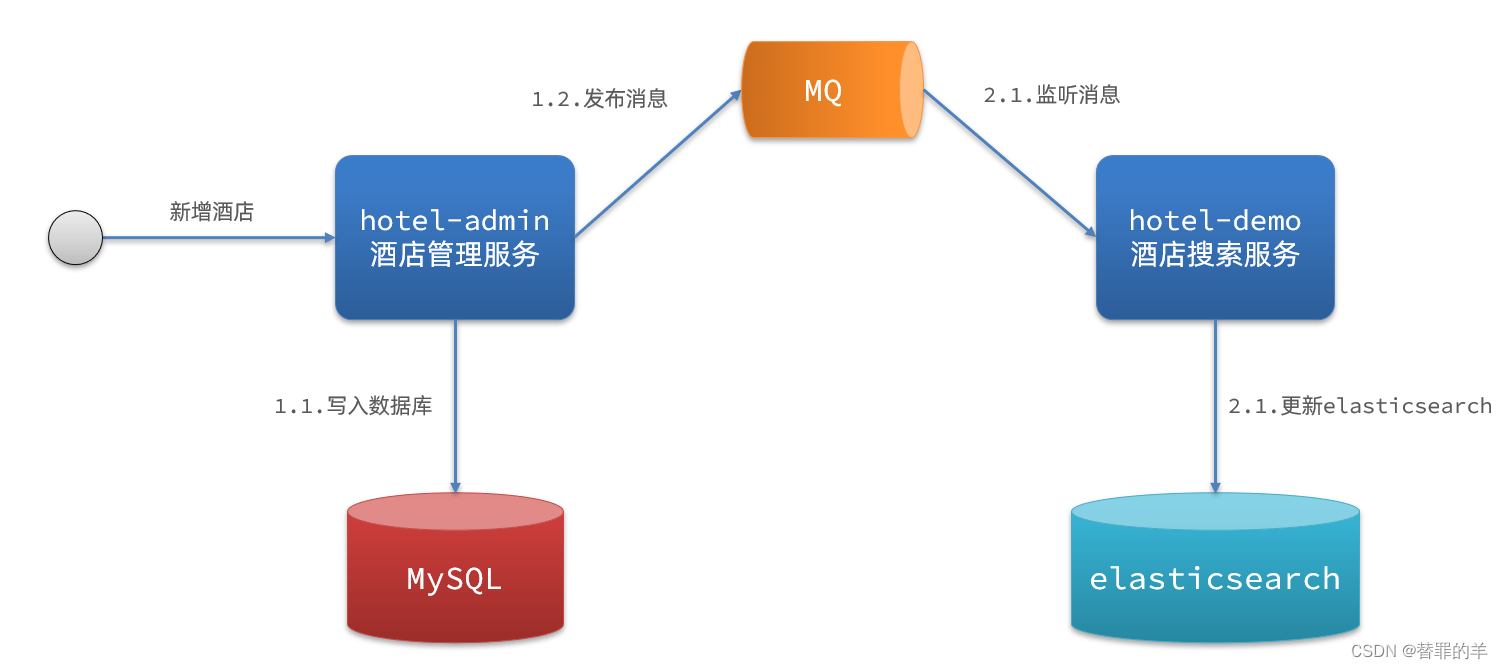
流程如下:
- hotel-admin对mysql数据库数据完成增、删、改后,发送MQ消息
- hotel-demo监听MQ,接收到消息后完成elasticsearch数据修改
3.监听binlog
方案三:监听binlog
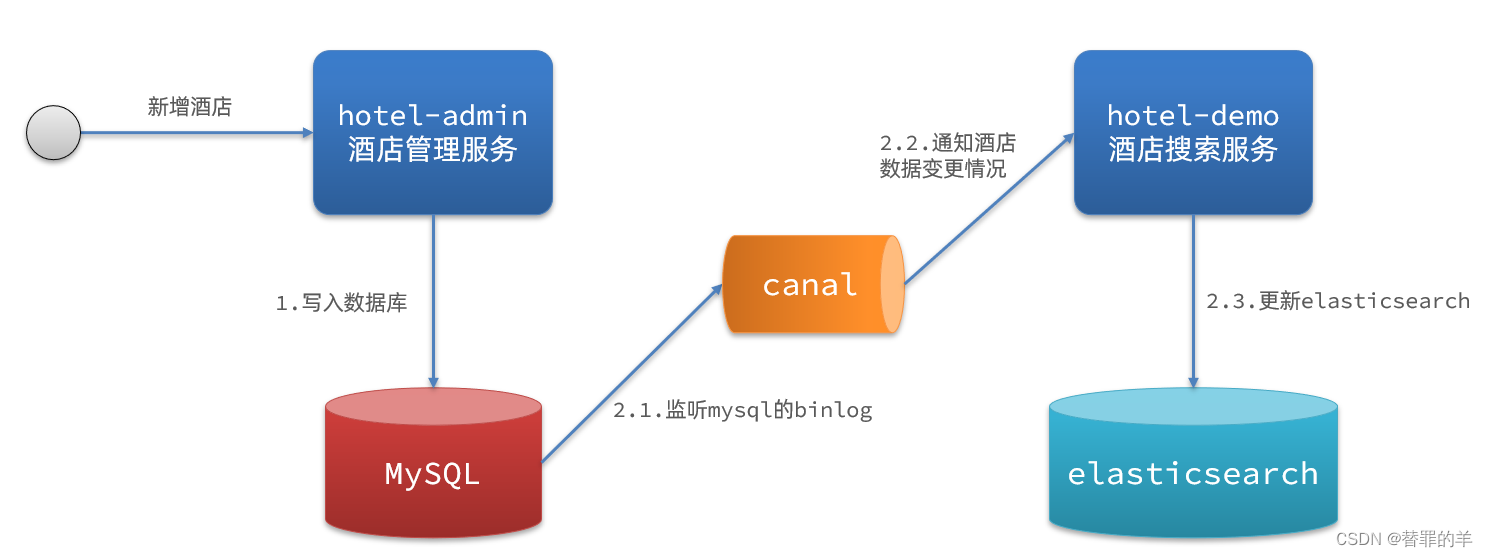
流程如下:
- 给mysql开启binlog功能
- mysql完成增、删、改操作都会记录在binlog中
- hotel-demo基于canal监听binlog变化,实时更新elasticsearch中的内容
4.选择
方式一:同步调用
- 优点:实现简单,粗暴
- 缺点:业务耦合度高
方式二:异步通知
- 优点:低耦合,实现难度一般
- 缺点:依赖mq的可靠性
方式三:监听binlog
- 优点:完全解除服务间耦合
- 缺点:开启binlog增加数据库负担、实现复杂度高
二.实现数据同步
1.思路
利用课前资料提供的hotel-admin项目作为酒店管理的微服务。当酒店数据发生增、删、改时,要求对elasticsearch中数据也要完成相同操作。
步骤:
-
导入课前资料提供的hotel-admin项目,启动并测试酒店数据的CRUD
-
声明exchange、queue、RoutingKey
-
在hotel-admin中的增、删、改业务中完成消息发送
-
在hotel-demo中完成消息监听,并更新elasticsearch中数据
-
启动并测试数据同步功能
2.导入demo
资料:资料在这里
导入资料提供的hotel-admin项目:
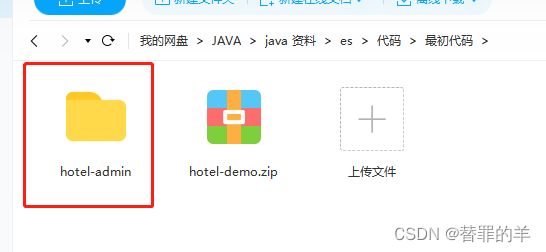
运行后,访问 http://localhost:8099
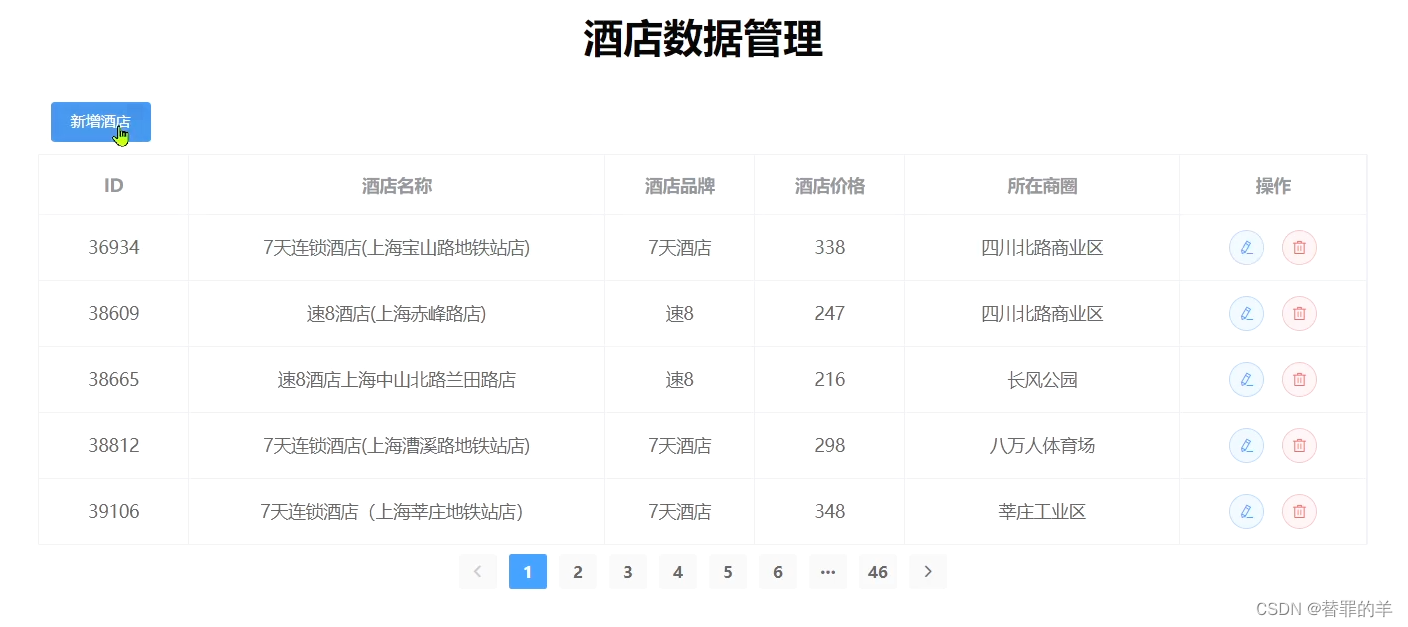
其中包含了酒店的CRUD功能:
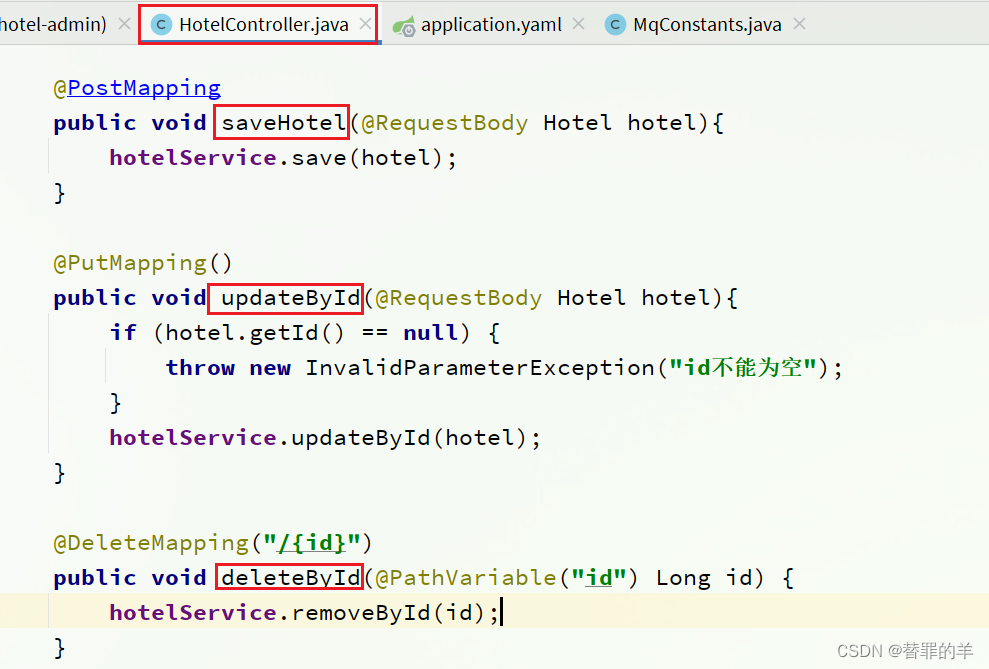
3.声明交换机、队列
MQ结构如图:

3.1引入依赖
在hotel-admin、hotel-demo中引入rabbitmq的依赖:
<!--amqp-->
<dependency><groupId>org.springframework.boot</groupId><artifactId>spring-boot-starter-amqp</artifactId>
</dependency>
3.2 配置文件
spring:rabbitmq:host: 192.168.1.100username: guestpassword: guestvirtual-host: /
3.3 声明队列交换机名称
在hotel-admin和hotel-demo中的cn.itcast.hotel.constants包下新建一个类MqConstants:
package cn.itcast.hotel.constants;public class MqConstants {/* 交换机*/public final static String HOTEL_EXCHANGE = "hotel.topic";/* 监听新增和修改的队列*/public final static String HOTEL_INSERT_QUEUE = "hotel.insert.queue";/* 监听删除的队列*/public final static String HOTEL_DELETE_QUEUE = "hotel.delete.queue";/* 新增或修改的RoutingKey*/public final static String HOTEL_INSERT_KEY = "hotel.insert";/* 删除的RoutingKey*/public final static String HOTEL_DELETE_KEY = "hotel.delete";
}
3.4 声明队列交换机
在hotel-demo中,定义配置类,声明队列、交换机:
package cn.itcast.hotel.config;import cn.itcast.hotel.constants.MqConstants;
import org.springframework.amqp.core.Binding;
import org.springframework.amqp.core.BindingBuilder;
import org.springframework.amqp.core.Queue;
import org.springframework.amqp.core.TopicExchange;
import org.springframework.context.annotation.Bean;
import org.springframework.context.annotation.Configuration;@Configuration
public class MqConfig {@Beanpublic TopicExchange topicExchange(){return new TopicExchange(MqConstants.HOTEL_EXCHANGE, true, false);}@Beanpublic Queue insertQueue(){return new Queue(MqConstants.HOTEL_INSERT_QUEUE, true);}@Beanpublic Queue deleteQueue(){return new Queue(MqConstants.HOTEL_DELETE_QUEUE, true);}@Beanpublic Binding insertQueueBinding(){return BindingBuilder.bind(insertQueue()).to(topicExchange()).with(MqConstants.HOTEL_INSERT_KEY);}@Beanpublic Binding deleteQueueBinding(){return BindingBuilder.bind(deleteQueue()).to(topicExchange()).with(MqConstants.HOTEL_DELETE_KEY);}
}
4.发送MQ消息
在hotel-admin中的增、删、改业务中分别发送MQ消息:
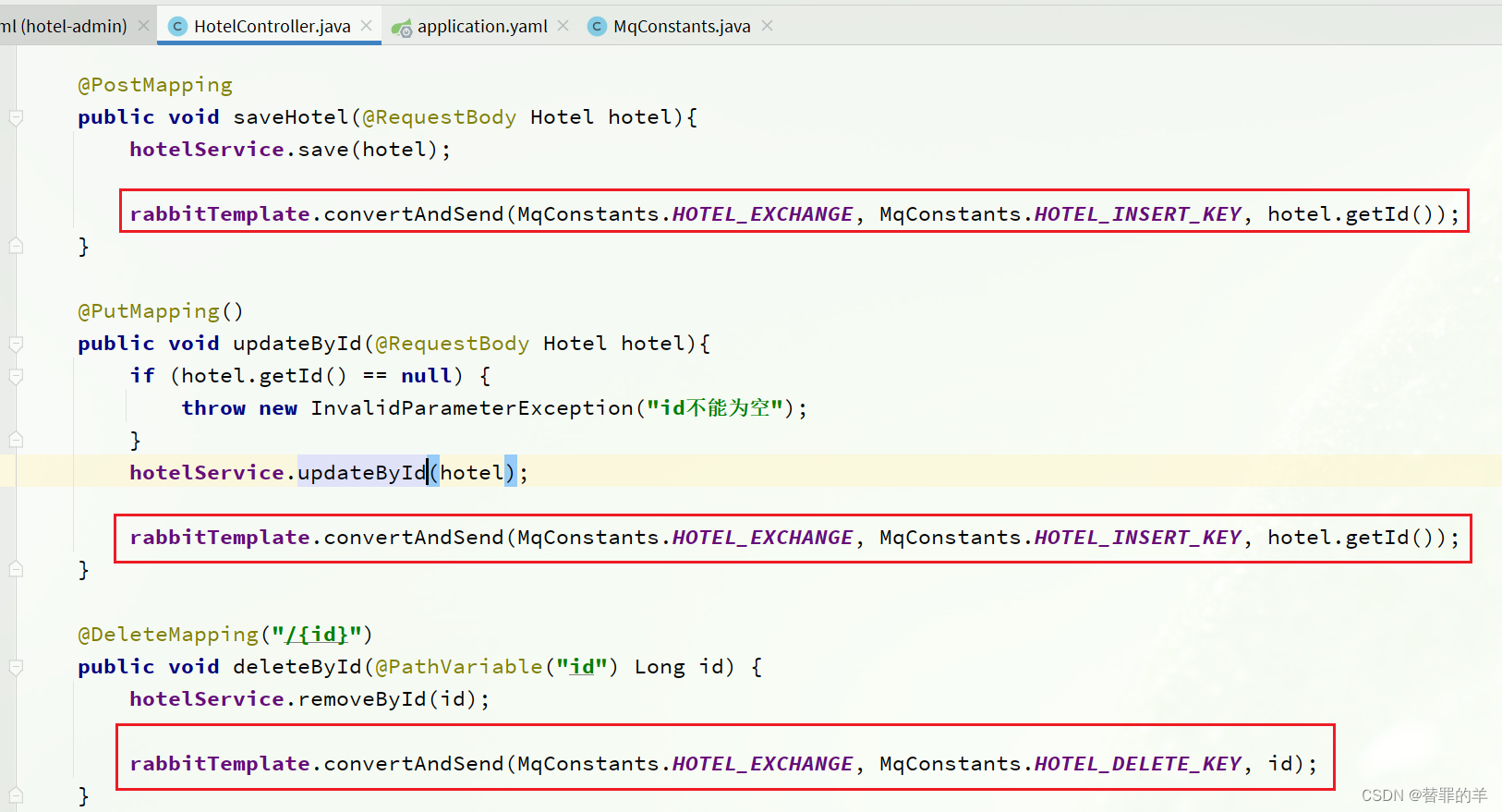
4.1 事务配置类
保证Rabbitmq在提交事务后执行。事务控制的详情
package cn.itcast.hotel.config;import com.sun.istack.internal.NotNull;
import org.slf4j.Logger;
import org.slf4j.LoggerFactory;
import org.springframework.stereotype.Component;
import org.springframework.transaction.support.TransactionSynchronizationAdapter;
import org.springframework.transaction.support.TransactionSynchronizationManager;import javax.annotation.PostConstruct;
import javax.annotation.PreDestroy;
import java.util.ArrayList;
import java.util.List;
import java.util.concurrent.*;@Component("afterCommitExecutor")
public class AfterCommitExecutor extends TransactionSynchronizationAdapter implements Executor {private static final ThreadLocal<List<Runnable>> RUNNABLES = new ThreadLocal<List<Runnable>>();private ThreadPoolExecutor threadPool;private Logger logger = LoggerFactory.getLogger(AfterCommitExecutor.class);@PostConstructpublic void init() {logger.debug("初始化线程池。。。");int availableProcessors = Runtime.getRuntime().availableProcessors();if (0 >= availableProcessors) {availableProcessors = 1;}int maxPoolSize = (availableProcessors > 5) ? availableProcessors * 2 : 5;logger.debug("CPU Processors :%s MaxPoolSize:%s", availableProcessors, maxPoolSize);threadPool = new ThreadPoolExecutor(availableProcessors,maxPoolSize,60,TimeUnit.SECONDS,new LinkedBlockingQueue<Runnable>(maxPoolSize * 2),Executors.defaultThreadFactory(),new RejectedExecutionHandler() {@Overridepublic void rejectedExecution(Runnable r, ThreadPoolExecutor executor) {logger.debug("Task:%s rejected", r.toString());if (!executor.isShutdown()) {executor.getQueue().poll();executor.execute(r);}}});}@PreDestroypublic void destroy() {logger.debug("销毁线程池。。。");if (null != threadPool && !threadPool.isShutdown()) {threadPool.shutdown();}}@Overridepublic void execute(@NotNull Runnable runnable) {if (!TransactionSynchronizationManager.isSynchronizationActive()) {runnable.run();return;}List<Runnable> threadRunnables = RUNNABLES.get();if (threadRunnables == null) {threadRunnables = new ArrayList<Runnable>();RUNNABLES.set(threadRunnables);TransactionSynchronizationManager.registerSynchronization(this);}threadRunnables.add(runnable);}@Overridepublic void afterCommit() {logger.debug("事务提交完成处理 ... ");List<Runnable> threadRunnables = RUNNABLES.get();for (int i = 0; i < threadRunnables.size(); i++) {Runnable runnable = threadRunnables.get(i);try {threadPool.execute(runnable);} catch (RuntimeException e) {logger.error("", e);}}}@Overridepublic void afterCompletion(int status) {logger.debug("事务处理完毕 .... ");RUNNABLES.remove();}
}
4.2 service 代码
@Override@Transactionalpublic boolean save(Hotel hotel) {logger.info("----- into insert service -----");hotel.setId(Long.getLong(UUID.randomUUID().toString()));int i = hotelMapper.insert(hotel);afterCommitExecutor.execute(new Runnable() {@Overridepublic void run() {rabbitTemplate.convertAndSend(MqConstants.HOTEL_EXCHANGE,MqConstants.HOTEL_INSERT_KEY,hotel.getId().toString());logger.info("----- rabbitmq send message -----");}});if (1==i ||"1".equals(1) ){return true;}else {return false;}}@Override@Transactionalpublic boolean updateById(Hotel hotel) {logger.info("----- into service -----");//修改DB的数据int i = hotelMapper.updateById(hotel);// 使用AfterCommitExecutorafterCommitExecutor.execute(new Runnable() {@Overridepublic void run() {rabbitTemplate.convertAndSend(MqConstants.HOTEL_EXCHANGE, MqConstants.HOTEL_INSERT_KEY, hotel.getId().toString());logger.info("----- rabbitmq send message -----");}});logger.info("--------- out service ----------");if (1==i ||"1".equals(1) ){return true;}else {return false;}}@Overridepublic void removeById(Long id) {logger.info("----- into service -----");//修改DB的数据int i = hotelMapper.deleteById(id);// 使用AfterCommitExecutorafterCommitExecutor.execute(new Runnable() {@Overridepublic void run() {rabbitTemplate.convertAndSend(MqConstants.HOTEL_EXCHANGE, MqConstants.HOTEL_DELETE_KEY, id);logger.info("----- rabbitmq send message -----");}});logger.info("--------- out service ----------");}5.接收MQ消息
hotel-demo接收到MQ消息要做的事情包括:
- 新增消息:根据传递的hotel的id查询hotel信息,然后新增一条数据到索引库
- 删除消息:根据传递的hotel的id删除索引库中的一条数据
1)首先在hotel-demo的cn.itcast.hotel.service包下的IHotelService中新增新增、删除业务
void deleteById(Long id);void insertById(Long id);
2)给hotel-demo中的cn.itcast.hotel.service.impl包下的HotelService中实现业务:
@Override
public void deleteById(Long id) {try {// 1.准备RequestDeleteRequest request = new DeleteRequest("hotel", id.toString());// 2.发送请求restHighLevelClient.delete(request, RequestOptions.DEFAULT);} catch (IOException e) {throw new RuntimeException(e);}
}@Override
public void insertById(Long id) {try {// 0.根据id查询酒店数据Hotel hotel = getById(id);// 转换为文档类型HotelDoc hotelDoc = new HotelDoc(hotel);// 1.准备Request对象IndexRequest request = new IndexRequest("hotel").id(hotel.getId().toString());// 2.准备Json文档request.source(JSON.toJSONString(hotelDoc), XContentType.JSON);// 3.发送请求restHighLevelClient.index(request, RequestOptions.DEFAULT);} catch (IOException e) {throw new RuntimeException(e);}
}
3)编写监听器
在hotel-demo中的cn.itcast.hotel.mq包新增一个类:
package cn.itcast.hotel.mq;import cn.itcast.hotel.constants.MqConstants;
import cn.itcast.hotel.service.IHotelService;
import org.springframework.amqp.rabbit.annotation.RabbitListener;
import org.springframework.beans.factory.annotation.Autowired;
import org.springframework.stereotype.Component;@Component
public class HotelListener {@Autowiredprivate IHotelService hotelService;/* 监听酒店新增或修改的业务* @param id 酒店id*/@RabbitListener(queues = MqConstants.HOTEL_INSERT_QUEUE)public void listenHotelInsertOrUpdate(Long id){hotelService.insertById(id);}/* 监听酒店删除的业务* @param id 酒店id*/@RabbitListener(queues = MqConstants.HOTEL_DELETE_QUEUE)public void listenHotelDelete(Long id){hotelService.deleteById(id);}
}


